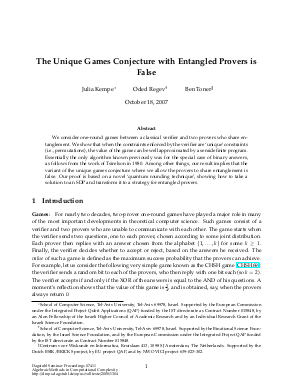The Unique Games Conjecture with Entangled Provers is False
Authors Julia Kempe, Oded Regev, Ben Toner
-
Part of:
Volume:
Dagstuhl Seminar Proceedings, Volume 7411
Part of: Series: Dagstuhl Seminar Proceedings (DagSemProc) - License:
 Creative Commons Attribution 4.0 International license
Creative Commons Attribution 4.0 International license
- Publication Date: 2008-01-15
File

PDF
DagSemProc.07411.6.pdf
- Filesize: 0.5 MB
- 17 pages
Document Identifiers
Subject Classification
Keywords
- Unique games
- entanglement
Metrics
- Access Statistics
-
Total Accesses (updated on a weekly basis)
0Document
0Metadata
Abstract
We consider one-round games between a classical verifier and two provers who share entanglement. We show that when the constraints enforced by the verifier are `unique' constraints (i.e., permutations), the value of the game can be well approximated by a semidefinite program. Essentially the only algorithm known previously was for the special case of binary answers, as follows from the work of Tsirelson in 1980. Among other things, our result implies that the variant of the unique games conjecture where we allow the provers to share entanglement is false. Our proof is based on a novel `quantum rounding technique', showing how to take a solution to an SDP and transform it to a strategy for entangled provers.
Cite As Get BibTex
Julia Kempe, Oded Regev, and Ben Toner. The Unique Games Conjecture with Entangled Provers is False. In Algebraic Methods in Computational Complexity. Dagstuhl Seminar Proceedings, Volume 7411, pp. 1-17, Schloss Dagstuhl – Leibniz-Zentrum für Informatik (2008)
https://doi.org/10.4230/DagSemProc.07411.6
BibTex
@InProceedings{kempe_et_al:DagSemProc.07411.6,
author = {Kempe, Julia and Regev, Oded and Toner, Ben},
title = {{The Unique Games Conjecture with Entangled Provers is False}},
booktitle = {Algebraic Methods in Computational Complexity},
pages = {1--17},
series = {Dagstuhl Seminar Proceedings (DagSemProc)},
ISSN = {1862-4405},
year = {2008},
volume = {7411},
editor = {Manindra Agrawal and Harry Buhrman and Lance Fortnow and Thomas Thierauf},
publisher = {Schloss Dagstuhl -- Leibniz-Zentrum f{\"u}r Informatik},
address = {Dagstuhl, Germany},
URL = {https://drops.dagstuhl.de/entities/document/10.4230/DagSemProc.07411.6},
URN = {urn:nbn:de:0030-drops-13048},
doi = {10.4230/DagSemProc.07411.6},
annote = {Keywords: Unique games, entanglement}
}
